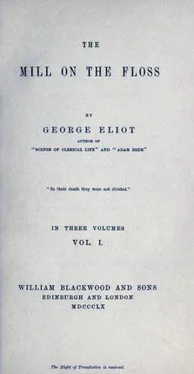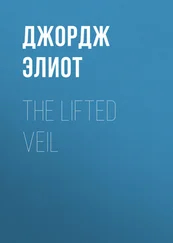"Ay, there's summat in that," said Mr. Tulliver.
"Father," broke in Maggie, who had stolen unperceived to her father's elbow again, listening with parted lips, while she held her doll topsy-turvy, and crushed its nose against the wood of the chair, — "father, is it a long way off where Tom is to go? Sha'n't we ever go to see him?"
"I don't know, my wench," said the father, tenderly. "Ask Mr. Riley; he knows."
Maggie came round promptly in front of Mr. Riley, and said, "How far is it, please, sir?"
"Oh, a long, long way off," that gentleman answered, being of opinion that children, when they are not naughty, should always be spoken to jocosely. "You must borrow the seven-leagued boots to get to him."
"That's nonsense!" said Maggie, tossing her head haughtily, and turning away, with the tears springing in her eyes. She began to dislike Mr. Riley; it was evident he thought her silly and of no consequence.
"Hush, Maggie! for shame of you, asking questions and chattering," said her mother. "Come and sit down on your little stool, and hold your tongue, do. But," added Mrs. Tulliver, who had her own alarm awakened, "is it so far off as I couldn't wash him and mend him?"
"About fifteen miles; that's all," said Mr. Riley. "You can drive there and back in a day quite comfortably. Or — Stelling is a hospitable, pleasant man — he'd be glad to have you stay."
"But it's too far off for the linen, I doubt," said Mrs. Tulliver, sadly.
The entrance of supper opportunely adjourned this difficulty, and relieved Mr. Riley from the labor of suggesting some solution or compromise, — a labor which he would otherwise doubtless have undertaken; for, as you perceive, he was a man of very obliging manners. And he had really given himself the trouble of recommending Mr. Stelling to his friend Tulliver without any positive expectation of a solid, definite advantage resulting to himself, notwithstanding the subtle indications to the contrary which might have misled a too-sagacious observer. For there is nothing more widely misleading than sagacity if it happens to get on a wrong scent; and sagacity, persuaded that men usually act and speak from distinct motives, with a consciously proposed end in view, is certain to waste its energies on imaginary game.
Plotting covetousness and deliberate contrivance, in order to compass a selfish end, are nowhere abundant but in the world of the dramatist: they demand too intense a mental action for many of our fellow-parishioners to be guilty of them. It is easy enough to spoil the lives of our neighbors without taking so much trouble; we can do it by lazy acquiescence and lazy omission, by trivial falsities for which we hardly know a reason, by small frauds neutralized by small extravagances, by maladroit flatteries, and clumsily improvised insinuations. We live from hand to mouth, most of us, with a small family of immediate desires; we do little else than snatch a morsel to satisfy the hungry brood, rarely thinking of seed-corn or the next year's crop.
Mr. Riley was a man of business, and not cold toward his own interest, yet even he was more under the influence of small promptings than of far-sighted designs. He had no private understanding with the Rev. Walter Stelling; on the contrary, he knew very little of that M.A. and his acquirements, — not quite enough, perhaps, to warrant so strong a recommendation of him as he had given to his friend Tulliver. But he believed Mr. Stelling to be an excellent classic, for Gadsby had said so, and Gadsby's first cousin was an Oxford tutor; which was better ground for the belief even than his own immediate observation would have been, for though Mr. Riley had received a tincture of the classics at the great Mudport Free School, and had a sense of understanding Latin generally, his comprehension of any particular Latin was not ready. Doubtless there remained a subtle aroma from his juvenile contact with the "De Senectute" and the fourth book of the "Æneid," but it had ceased to be distinctly recognizable as classical, and was only perceived in the higher finish and force of his auctioneering style. Then, Stelling was an Oxford man, and the Oxford men were always — no, no, it was the Cambridge men who were always good mathematicians. But a man who had had a university education could teach anything he liked; especially a man like Stelling, who had made a speech at a Mudport dinner on a political occasion, and had acquitted himself so well that it was generally remarked, this son-in-law of Timpson's was a sharp fellow. It was to be expected of a Mudport man, from the parish of St. Ursula, that he would not omit to do a good turn to a son-in-law of Timpson's, for Timpson was one of the most useful and influential men in the parish, and had a good deal of business, which he knew how to put into the right hands. Mr. Riley liked such men, quite apart from any money which might be diverted, through their good judgment, from less worthy pockets into his own; and it would be a satisfaction to him to say to Timpson on his return home, "I've secured a good pupil for your son-in-law." Timpson had a large family of daughters; Mr. Riley felt for him; besides, Louisa Timpson's face, with its light curls, had been a familiar object to him over the pew wainscot on a Sunday for nearly fifteen years; it was natural her husband should be a commendable tutor. Moreover, Mr. Riley knew of no other schoolmaster whom he had any ground for recommending in preference; why, then, should he not recommend Stelling? His friend Tulliver had asked him for an opinion; it is always chilling, in friendly intercourse, to say you have no opinion to give. And if you deliver an opinion at all, it is mere stupidity not to do it with an air of conviction and well-founded knowledge. You make it your own in uttering it, and naturally get fond of it. Thus Mr. Riley, knowing no harm of Stelling to begin with, and wishing him well, so far as he had any wishes at all concerning him, had no sooner recommended him than he began to think with admiration of a man recommended on such high authority, and would soon have gathered so warm an interest on the subject, that if Mr. Tulliver had in the end declined to send Tom to Stelling, Mr. Riley would have thought his "friend of the old school" a thoroughly pig-headed fellow.
If you blame Mr. Riley very severely for giving a recommendation on such slight grounds, I must say you are rather hard upon him. Why should an auctioneer and appraiser thirty years ago, who had as good as forgotten his free-school Latin, be expected to manifest a delicate scrupulosity which is not always exhibited by gentlemen of the learned professions, even in our present advanced stage of morality?
Besides, a man with the milk of human kindness in him can scarcely abstain from doing a good-natured action, and one cannot be good-natured all round. Nature herself occasionally quarters an inconvenient parasite on an animal toward whom she has otherwise no ill will. What then? We admire her care for the parasite. If Mr. Riley had shrunk from giving a recommendation that was not based on valid evidence, he would not have helped Mr. Stelling to a paying pupil, and that would not have been so well for the reverend gentleman. Consider, too, that all the pleasant little dim ideas and complacencies — of standing well with Timpson, of dispensing advice when he was asked for it, of impressing his friend Tulliver with additional respect, of saying something, and saying it emphatically, with other inappreciably minute ingredients that went along with the warm hearth and the brandy-and-water to make up Mr. Riley's consciousness on this occasion — would have been a mere blank.
Chapter IV. Tom Is Expected
It was a heavy disappointment to Maggie that she was not allowed to go with her father in the gig when he went to fetch Tom home from the academy; but the morning was too wet, Mrs. Tulliver said, for a little girl to go out in her best bonnet. Maggie took the opposite view very strongly, and it was a direct consequence of this difference of opinion that when her mother was in the act of brushing out the reluctant black crop Maggie suddenly rushed from under her hands and dipped her head in a basin of water standing near, in the vindictive determination that there should be no more chance of curls that day.
Читать дальше












